InterGlobe Aviation Bundle
Who Really Owns IndiGo?
The ownership structure of any company is a roadmap to its future, and for InterGlobe Aviation, the parent company of IndiGo, that roadmap is particularly fascinating. From its humble beginnings in 2006 to its current dominance of the Indian aviation industry, understanding the InterGlobe Aviation SWOT Analysis is crucial to understanding its success. Knowing who controls this airline is key to understanding its strategic direction.
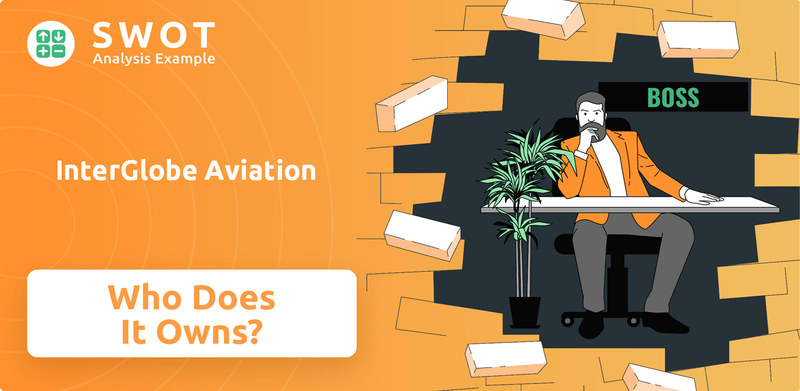
This exploration into the ownership of InterGlobe Aviation, also known as IndiGo Airlines, is essential for anyone looking to understand the dynamics of the aviation industry. We'll examine the evolution of its ownership, from the founders' initial stakes to the influence of public shareholders. Uncovering the Indigo owner and the company's major shareholders provides valuable insights into its past performance and future trajectory, impacting everything from the InterGlobe Aviation stock price to its overall financial performance.
Who Founded InterGlobe Aviation?
In 2006, Rahul Bhatia and Rakesh Gangwal established InterGlobe Aviation, the parent company of Indigo Airlines. Bhatia, through InterGlobe Enterprises, brought extensive experience from the hospitality and travel sectors. Gangwal, an industry veteran, contributed significant expertise from his career at United Airlines and US Airways.
The initial ownership structure of InterGlobe Aviation reflected a clear division of control. InterGlobe Enterprises, primarily owned by Rahul Bhatia and his family, held a majority stake. Rakesh Gangwal maintained a significant minority stake in the company. This arrangement granted InterGlobe Enterprises substantial control over the airline's operations.
The founders' vision for a no-frills, on-time, and affordable airline was central to the company's strategy from the outset. This vision influenced the distribution of control to ensure the efficient execution of this business model. The initial funding primarily came from the founders themselves, with no publicly reported early angel investors or friends and family acquiring significant stakes during the initial phase.
The initial ownership structure of InterGlobe Aviation was primarily split between Rahul Bhatia, through InterGlobe Enterprises, and Rakesh Gangwal. This structure was designed to leverage the strengths of each founder.
- Rahul Bhatia, through InterGlobe Enterprises, held a majority stake, providing control.
- Rakesh Gangwal held a significant minority stake, contributing aviation industry expertise.
- The founders' initial investment was the primary source of funding, with no early external investors.
- The ownership structure supported the founders' vision for a low-cost, efficient airline.
InterGlobe Aviation SWOT Analysis
- Complete SWOT Breakdown
- Fully Customizable
- Editable in Excel & Word
- Professional Formatting
- Investor-Ready Format
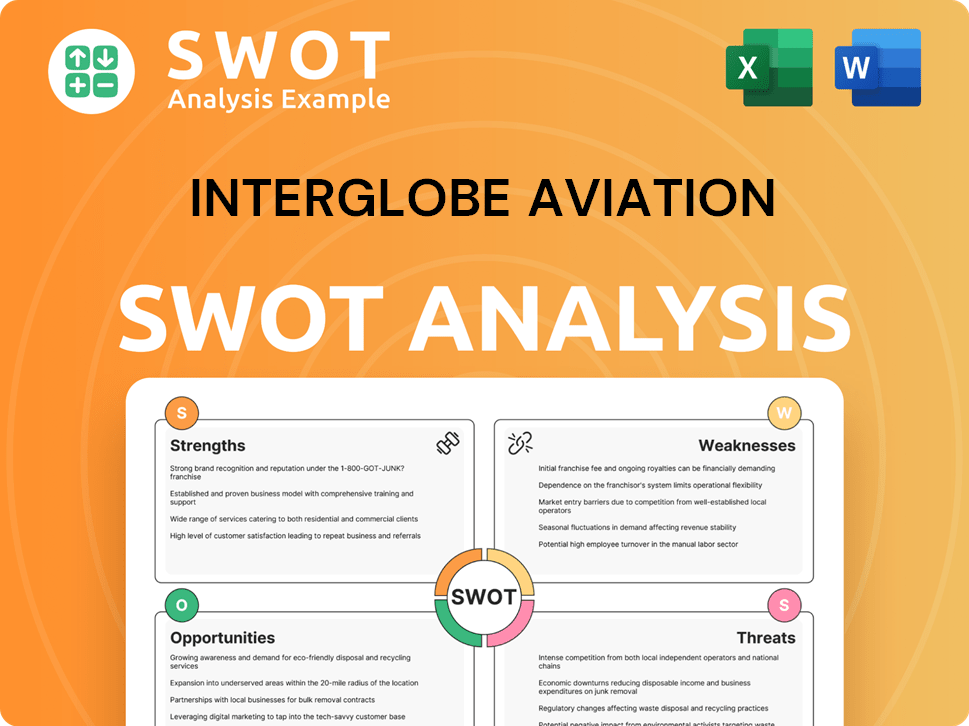
How Has InterGlobe Aviation’s Ownership Changed Over Time?
The ownership structure of InterGlobe Aviation, operating as IndiGo, has evolved significantly since its Initial Public Offering (IPO) on November 10, 2015. The IPO was a pivotal moment, transforming the airline from a privately held entity to a publicly listed one. This move introduced a broader shareholder base, including institutional and retail investors. The IPO successfully raised approximately INR 3,018 crore, equivalent to around USD 450 million at the time, which fueled the company's growth and expansion within the competitive aviation industry.
The evolution of the ownership structure of IndiGo has been marked by key events, including the IPO and subsequent shifts in major stakeholders. Rakesh Gangwal, a co-founder, gradually reduced his stake through significant share sales in 2022 and 2023. For example, in February 2023, Gangwal sold a 2.74% stake for approximately INR 2,000 crore. These changes have redistributed ownership among public and institutional investors, impacting the company's governance and strategic direction. Understanding the Marketing Strategy of InterGlobe Aviation provides insights into the company’s growth.
| Event | Date | Impact |
|---|---|---|
| IPO | November 10, 2015 | Transitioned from private to public, raised ~INR 3,018 crore. |
| Rakesh Gangwal Share Sales | 2022-2023 | Reduced Gangwal's stake, redistributed ownership. |
| Institutional Investor Growth | Ongoing (through Q1 2025) | Increased holdings by FPIs and DIIs, influencing governance. |
As of early 2025, the major stakeholders in InterGlobe Aviation include the promoter group, led by Rahul Bhatia, who maintains a substantial stake. Institutional investors, such as foreign portfolio investors (FPIs) and domestic institutional investors (DIIs), have also significantly increased their holdings, reflecting confidence in IndiGo's market position and the Indian aviation industry. This diversification has led to increased scrutiny and demands for transparency, influencing the company's governance and strategic decisions. As of the quarter ending March 31, 2025, FPIs collectively held a substantial percentage of the company's shares.
The ownership of IndiGo has shifted since its IPO, with key changes in major shareholders.
- Promoter group, led by Rahul Bhatia, remains a key stakeholder.
- Rakesh Gangwal reduced his stake through share sales.
- Institutional investors, including FPIs and DIIs, have increased their holdings.
- The changes reflect a more diversified ownership base, impacting governance.
InterGlobe Aviation PESTLE Analysis
- Covers All 6 PESTLE Categories
- No Research Needed – Save Hours of Work
- Built by Experts, Trusted by Consultants
- Instant Download, Ready to Use
- 100% Editable, Fully Customizable
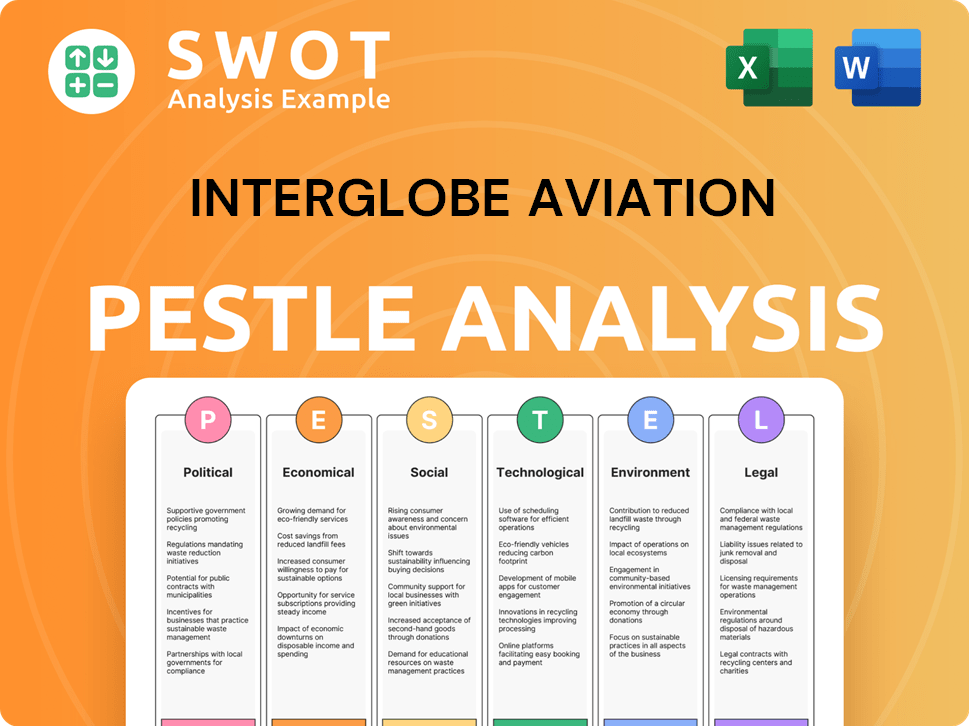
Who Sits on InterGlobe Aviation’s Board?
As of early 2025, the Board of Directors of InterGlobe Aviation, also known as Indigo Airlines, comprises a blend of promoter representatives, independent directors, and professional executives. This structure reflects the evolution of the company's ownership and governance. The board usually includes members representing the interests of the promoter group, InterGlobe Enterprises, alongside independent directors who provide oversight and strategic guidance. Rahul Bhatia, a key member of the promoter group, holds a significant position on the board, directly linking the founding ownership to the company's governance.
The board's composition ensures a balance between the interests of the founders and the need for independent oversight. The presence of independent directors is crucial for maintaining corporate governance standards, particularly in a publicly listed company. This balance is aimed at ensuring strategic direction and effective management of the airline. The board's role includes overseeing the company's strategic direction, financial performance, and compliance with regulations, ensuring the long-term sustainability and growth of the airline.
| Board Member | Role | Affiliation |
|---|---|---|
| Rahul Bhatia | Director | Promoter Group (InterGlobe Enterprises) |
| Independent Directors | Various | Independent Oversight |
| Professional Executives | Various | Management and Operations |
The voting structure of InterGlobe Aviation is primarily based on a one-share-one-vote principle for its equity shares listed on the stock exchanges. However, the influence of the promoter group, holding a substantial block of shares, translates into significant voting power. This control extends to key decisions, including board appointments and strategic initiatives. While there are no publicly reported dual-class shares or golden shares, the concentrated ownership of the promoter group provides them with considerable influence. The Growth Strategy of InterGlobe Aviation highlights the company's expansion plans, which are significantly influenced by the board's decisions.
The board includes promoter representatives and independent directors.
- Rahul Bhatia, a key member of the promoter group, is on the board.
- Voting is primarily one-share-one-vote, but promoters have significant influence.
- The board oversees strategic direction, financial performance, and compliance.
- Independent directors provide oversight and strategic guidance.
InterGlobe Aviation Business Model Canvas
- Complete 9-Block Business Model Canvas
- Effortlessly Communicate Your Business Strategy
- Investor-Ready BMC Format
- 100% Editable and Customizable
- Clear and Structured Layout
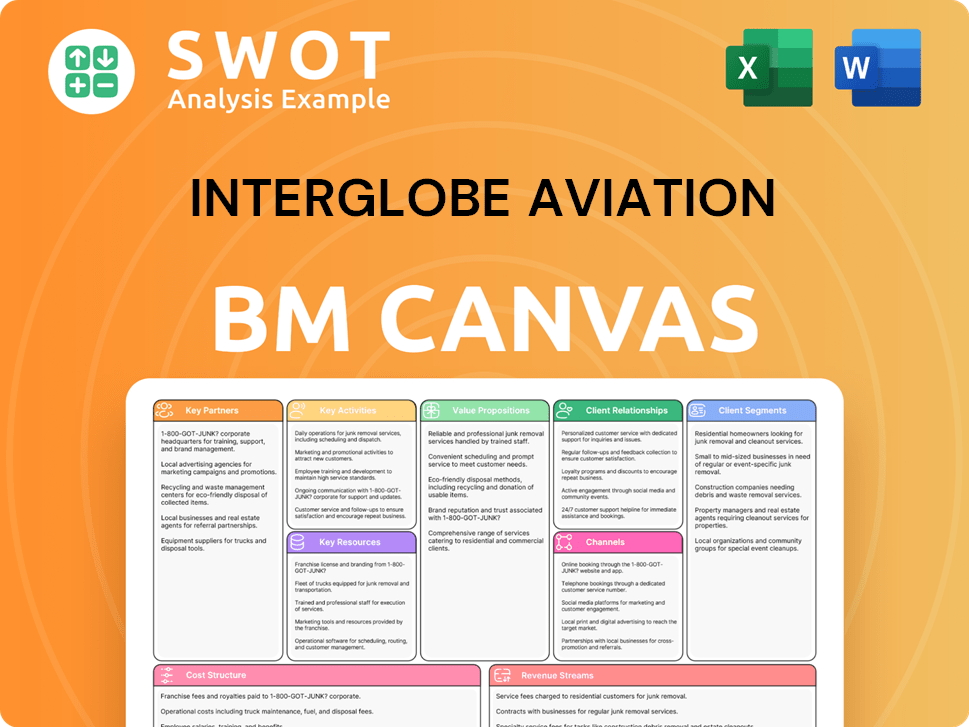
What Recent Changes Have Shaped InterGlobe Aviation’s Ownership Landscape?
Over the past few years, from 2022 to early 2025, the ownership structure of InterGlobe Aviation, also known as IndiGo, has seen some notable shifts. A significant development has been the gradual reduction of co-founder Rakesh Gangwal's stake in the airline company. For instance, in February 2023, Gangwal sold a 2.74% stake in InterGlobe Aviation, valued at approximately INR 2,000 crore, through block deals. This follows earlier share sales in 2022, indicating a strategic exit from his direct shareholding.
Simultaneously, there's been a trend of increasing institutional ownership in InterGlobe Aviation, particularly from foreign portfolio investors (FPIs) and domestic institutional investors (DIIs). This reflects a broader industry pattern of rising institutional participation in well-performing companies within emerging markets like India. The increased institutional holding can lead to greater demand for robust corporate governance and transparency, which is essential for the aviation industry.
| Metric | Value | Year |
|---|---|---|
| Market Capitalization (approx.) | INR 1.5 Lakh Crore | 2024 |
| Revenue (FY24, approx.) | INR 75,000 Crore | 2024 |
| Number of Aircraft (approx.) | 350+ | 2024 |
The appointment of Pieter Elbers as CEO in 2022 also represents a shift in the operational leadership, though the core ownership structure of the promoter group remains consistent. The company has consistently focused on expanding its domestic and international network, which may necessitate future capital raises or strategic partnerships, potentially influencing ownership dynamics further down the line. The current CEO of IndiGo is Pieter Elbers.
The stock price of InterGlobe Aviation has shown positive growth, reflecting the company's strong market position and expansion strategies. Investors interested in the aviation industry often monitor the company's financial performance closely. The company is a publicly traded company.
The shareholding pattern of InterGlobe Aviation includes a mix of promoters, institutional investors, and the public. Institutional investors, including FPIs and DIIs, have been increasing their stake. The major shareholders are Rakesh Gangwal and Rahul Bhatia.
The ownership structure of IndiGo is primarily controlled by its founders and key shareholders. The company's commitment to growth and expansion may influence future ownership dynamics. The parent company of IndiGo is InterGlobe Aviation Ltd.
InterGlobe Aviation's future hinges on its ability to manage growth, navigate market challenges, and maintain operational efficiency. The airline's expansion plans, including aircraft orders, suggest a focus on long-term value creation. The company is headquartered in Gurugram, India.
InterGlobe Aviation Porter's Five Forces Analysis
- Covers All 5 Competitive Forces in Detail
- Structured for Consultants, Students, and Founders
- 100% Editable in Microsoft Word & Excel
- Instant Digital Download – Use Immediately
- Compatible with Mac & PC – Fully Unlocked
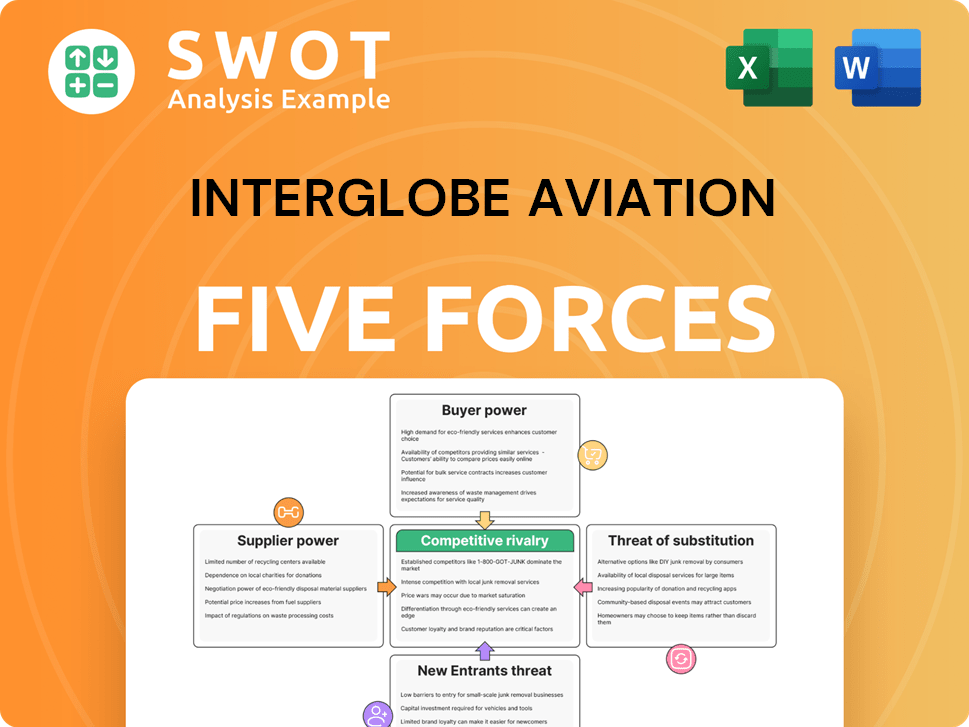
Related Blogs
- What are Mission Vision & Core Values of InterGlobe Aviation Company?
- What is Competitive Landscape of InterGlobe Aviation Company?
- What is Growth Strategy and Future Prospects of InterGlobe Aviation Company?
- How Does InterGlobe Aviation Company Work?
- What is Sales and Marketing Strategy of InterGlobe Aviation Company?
- What is Brief History of InterGlobe Aviation Company?
- What is Customer Demographics and Target Market of InterGlobe Aviation Company?
Disclaimer
All information, articles, and product details provided on this website are for general informational and educational purposes only. We do not claim any ownership over, nor do we intend to infringe upon, any trademarks, copyrights, logos, brand names, or other intellectual property mentioned or depicted on this site. Such intellectual property remains the property of its respective owners, and any references here are made solely for identification or informational purposes, without implying any affiliation, endorsement, or partnership.
We make no representations or warranties, express or implied, regarding the accuracy, completeness, or suitability of any content or products presented. Nothing on this website should be construed as legal, tax, investment, financial, medical, or other professional advice. In addition, no part of this site—including articles or product references—constitutes a solicitation, recommendation, endorsement, advertisement, or offer to buy or sell any securities, franchises, or other financial instruments, particularly in jurisdictions where such activity would be unlawful.
All content is of a general nature and may not address the specific circumstances of any individual or entity. It is not a substitute for professional advice or services. Any actions you take based on the information provided here are strictly at your own risk. You accept full responsibility for any decisions or outcomes arising from your use of this website and agree to release us from any liability in connection with your use of, or reliance upon, the content or products found herein.